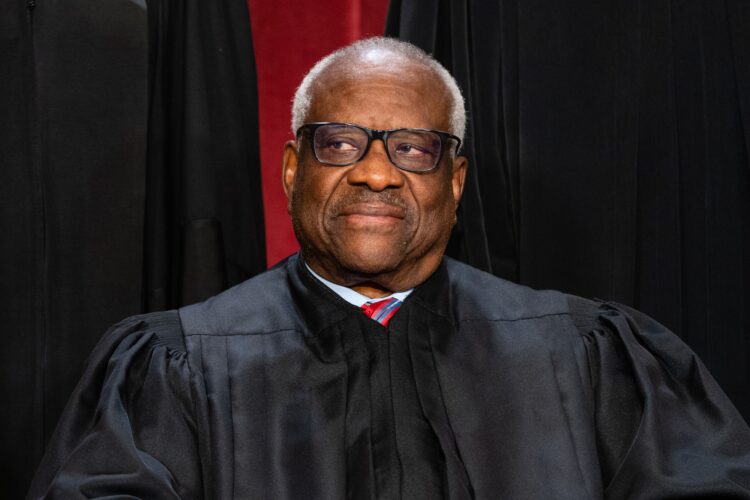By Theodobare Davil-
Clarence Thomas faces fresh calls to resign after more billionaire gifts revealed
Democratic members of Congress have revived their demands for the resignation of US Supreme Court Justice Clarence The call for Thomas’s resignation follows the largest accounting of the gifts, luxury vacations and private travel he received from a group of wealthy benefactors in his years on the nation’s highest court.
The U.S. Supreme Court, a bastion of the American judicial system, is once again under the spotlight as calls for the resignation of Justice Clarence Thomas resurface following revelations of substantial gifts from billionaires. The ethical and legal dimensions of this issue are intricate, raising questions about judicial impartiality, the role of private wealth in the legal system, and the broader implications for the credibility of the judiciary. As the nation watches this unfolding controversy, it is imperative to examine the various aspects at play.
News outlet, ProPublica revealed undeclared links to Crow including luxury holidays and travel; a real estate sale to the benefit of Thomas’s mother; and school fees paid for his grand nephew. It has also reported on links between another arch-conservative justice, Samuel Alito, and another billionaire, Paul Singer.
“He’s corrupt as hell and should resign today,” US Rep Bill Pascrell of New Jersey wrote on 10 August following ProPublica’s latest investigation.
A months-long probe has uncovered previously undisclosed travel, hospitality and gifts from influential billionaires with connections to right-wing interest groups with business before the court – from private flights and yacht cruises to resort accommodations and VIP tickets to sporting events that legal experts argue are likely to violate disclosure requirements.
“He’s corrupt as hell and should resign today,” US Rep Bill Pascrell of New Jersey wrote on 10 August following ProPublica’s latest investigation.
US Rep Gerry Connolly said that “no Justice should accept these types of gifts.”
“Thomas has repeatedly brought dishonor and ethical malpractice to our highest Court,” he wrote. “I reiterate my call that he must resign. This is exactly why we need SCOTUS ethics reform.”
The US supreme court justice Clarence Thomas appears to have violated US law by failing to disclose “flights, yacht cruises and expensive sports tickets” bestowed by wealthy friends behind at least 38 destination vacations, ethics experts told ProPublica in its latest blockbuster report on the conservative judge and his friends.
The “It’s so obvious,” Richard Painter, a White House ethics chief under George W Bush, told the nonprofit website. “It all has to be reported.”
The report is the latest in a string of exposés of links between Thomas, 75, and rich benefactors, many donors to conservative causes, prominently including the real-estate magnate Harlan Crow.
ProPublica has revealed undeclared links to Crow including luxury holidays and travel; a real estate sale to the benefit of Thomas’s mother; and school fees paid for his grand nephew. It has also reported on links between another arch-conservative justice, Samuel Alito, and another billionaire, Paul Singer.
The recent revelations that Justice Clarence Thomas received significant gifts from billionaires have ignited concerns about the influence of private wealth on the judicial process. The gifts, often in the form of expensive gifts or luxurious vacations, have raised eyebrows regarding their potential to compromise judicial impartiality and independence. The principle of judicial independence is vital to a fair and transparent legal system, ensuring that judges are free from undue influence and can make decisions based solely on the law and evidence before them.
When justices accept lavish gifts from individuals who may have vested interests in the court’s decisions, it can erode public trust in the judiciary. The perception of bias or favoritism can undermine the legitimacy of court rulings, regardless of the justices’ actual intentions. Maintaining the public’s confidence in the fairness and integrity of the Supreme Court is paramount to upholding the rule of law.
Ethical Considerations and Accountability
The ethics of accepting gifts, particularly from wealthy individuals who may appear before the court or have interests tied to cases, raise a complex set of questions. While there are regulations in place to ensure transparency and accountability, the interpretation of these rules and their enforcement can vary. Critics argue that the financial relationships between justices and wealthy benefactors should be more transparent, with clearer guidelines to prevent any appearance of impropriety.
The controversy surrounding Justice Thomas is not an isolated incident; ethical concerns have been raised about other justices’ financial relationships in the past. This highlights the need for consistent and rigorous ethical standards that safeguard the court’s integrity and the trust of the American people.
Calls for Justice Thomas’s resignation are not occurring in a vacuum; they are part of a broader conversation about judicial reform and accountability. Advocates for change emphasize the need for stronger ethical guidelines, more robust oversight mechanisms, and greater transparency in the judicial branch.
However, the issue is complicated by the constitutional principle of judicial independence. The separation of powers dictates that the judiciary must remain free from political pressures. Any reform efforts must carefully balance the imperative for accountability with the necessity of preserving the judiciary’s autonomy.




